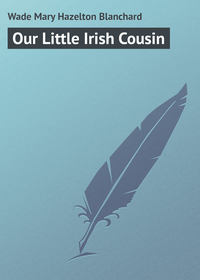 полная версия
полная версияOur Little Porto Rican Cousin
Balconies jut out from the upper story, and Manuel and Dolores like to sit here and watch the passers-by.
It is so odd to see the milkman ride up to the house astride of his donkey, with his milk cans jostling against each other between his legs. Sometimes a cow is led through the streets, and her owner stops at neighbouring doorways to draw the milk as the people wish. Dolores thinks the milk must be much nicer when obtained in this way.
"But look, now, Manuel," she says, "at that poor mule! He is almost smothered under an immense bundle of fodder; and, as though that were not enough for the poor beastie, his master is riding on top of the load."
Sometimes the children rise as early as five o'clock in the morning. They like to go to the market held in a public square of the city. They see people of all shades of colour selling their goods.
There is the baker with his bags of freshly baked bread and oddly twisted rolls; there is the poultry man with wicker cages full of live fowls hanging to the sides of his half-starved donkey; there, too, is the butcher with sides of beef hanging by hooks from his horse's harness; while crowded together are those who have brought their fruits and vegetables afoot many a long mile in early morning.
There are great piles of yellow oranges; plantains, green, brown, and yellow; pineapples, melons, onions, guavas, and lemons; while behind them sit their owners, who laugh and joke and make love, and at the same time are busy shouting their wares and making bargains.
Oh, but one must not forget the game-cocks fastened to stakes here and there in the midst of the busy crowd. Many a trade is made, many a bet laid on these ugly, skinny, but greatly admired cocks as they pull at their stakes.
Later in the day no sign of this busy scene is left in the public square. One notices for the first time that there is a band stand, and when the evening comes, Manuel's father and mother are driven with their hosts to this square. Many other carriages, filled with richly dressed ladies and gentlemen, also arrive and take their places at one side of the band stand. Here they sit laughing and chatting or listening to the music; the ladies' black eyes sparkle as a favourite tune is played, and they keep time by gentle taps of their fans.
Many of these fans are very beautiful. Manuel's mother has one made of the feathers of humming-birds. It is brilliant, even in the soft light of evening, and the dear lady herself looks very charming with a lace mantilla drawn over her head, its point reaching down over the forehead almost to her nose. To be sure, her cheeks are heavily powdered, but that is the fashion of all the ladies in her land, and so it seems quite natural.
The rest of the square is filled with the crowd of poorer people who cannot afford to ride. They walk slowly about, and seem to enjoy the music and each other's company as much as those who sit in the carriages.
There are many street processions in San Juan, and the children are on the lookout not to miss them. These processions are in honour of some saint. Dolores is out on the balcony one morning when she hears music. It is the voices of children singing.
"O Manuel, Teresa, mamma, do come and see the pretty sight," she calls, as a procession draws near.
People dressed in the costumes of different lands come marching by; then follows a cart, decked gaily with flowers, and in it stands a little girl dressed to represent the virgin mother of Jesus. There is a band of music playing sacred airs.
The children take their hats and follow the procession to the public square, where the little girl in the flower-decked carriage recites a poem written in honour of the day. All business stops in the stores near by. All vehicles give way to the procession, and the passers-by stand still to admire and listen.
It seems strange to the children to see the red, white, and blue of the American flag floating over the city, instead of the colours of Spain – the red and yellow they were formerly taught to love.
"But this new flag means friendship, you know, Dolores," says her brother. "The poor will not be taxed so much as they used to be, and the good Americans will not allow any other people to harm us. At least father says so, and he is very wise. Dolores, he has promised to take us sometime to that wonderful city, New York, where we shall see so much we have never even dreamed of. I hope the time will come soon, for I want to get acquainted with my American cousins in their own land, our own land, now."









